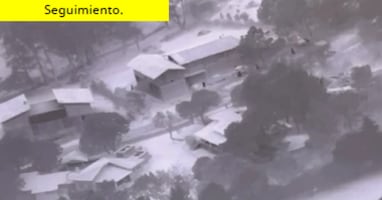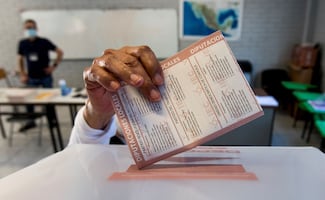Más Información

Trevilla narra operativo contra "El Mencho": pareja del capo fue clave; con voz cortada da pésame a familiares de compañeros fallecidos

Reportan que AICM opera con normalidad; van 58 vuelos cancelados y 11 demorados por violencia en Jalisco

Reforma electoral de Sheinbaum vuelve a atorarse por desacuerdo de PT y PVEM; iniciativa mantiene reducción de pluris y recorte presupuestal
Why did the disappearance of Marco Antonio Sánchez, 17, prompted the mobilization of several organizations, as well as requests from the National Autonomous University of Mexico (UNAM) and the United Nations (UN) to have the case solved as quickly and transparently as possible?
The last time Marco Antonio was seen was on Tuesday, January 23, when he was arrested by Mexico City police officers . This was a source of indignation. The young man appeared yesterday, beaten, missing a shoe, and “disoriented.”
Human rights organizations made a call to the authorities demanding the cops involved in Marco Antonio's arrest be investigated so they could provide the whereabouts of this young man, a student at Public High School No. 8, of the UNAM.
Data available spoke of a situation where human rights had been violated – a situation this country has tried to prevent by modifying its regulations and creating institutions.
For the UNAM, Marco Antonio Sánchez was wrongfully arrested, reason why the University requested to have liabilities be determined and those responsible be found. For their part, the UN's High Commissioner for Human Rights made a call to the Government of Mexico City to investigate the case not as a kidnapping but as an enforced disappearance , and they considered urgent that both, Marco Antonio and his family, had access to justice and received a restitution of damages.
For many years, young people have been a synonym of conflict for several authorities, and they are frequently considered criminals, instead of fighting for their inclusion and encouraging them to take advantage of sports and cultural areas in the cities.
Even if this young man had committed a crime, the force used by the police officers goes beyond what protocols dictate for these kind of situations, above all when dealing with a minor. The conditions in which he was found deserve even more explanations.
The social reaction and that of important institutions is sending the clear message to the government that the use of excessive force is no longer tolerated.
In no city or country should people see law enforcement agents as agents to be feared and dreaded. For the good of our country, we need to forge a relationship of closeness and trust.
am
Noticias según tus intereses
[Publicidad]
[Publicidad]











